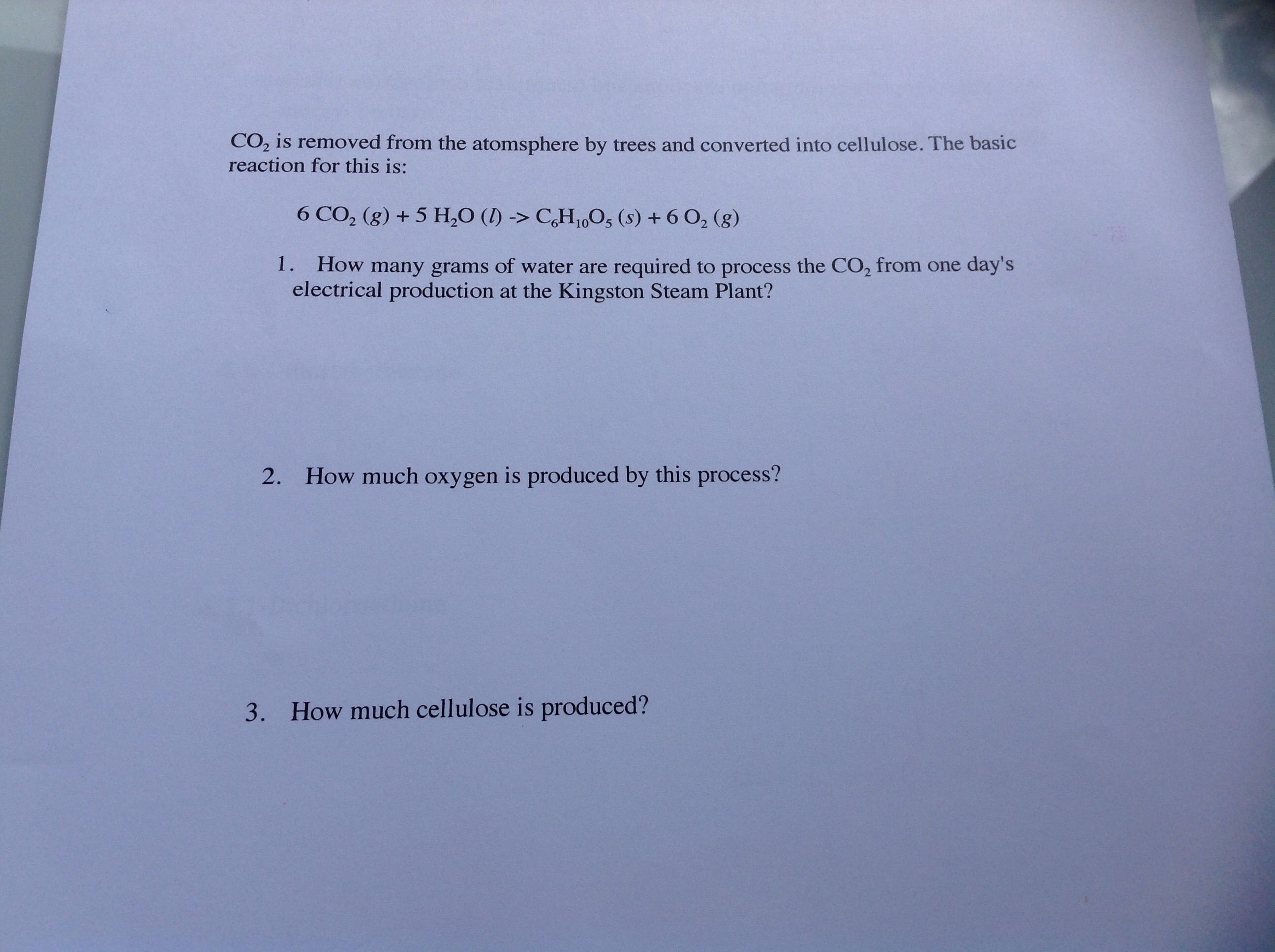The basic process will be to first determine the moles and then determine the mass.
"mol A"="mass A"xx("mol A")/("molar mass A")
color(white)(..................................)uarr
color(white)(..................) (Look up online or calculate).
Convert mol A to mol B using the mol A: mol B ratio from the balanced equation.
"mol B"="mol A"xx("mol B")/("mol A")
Then determine the mass from the moles.
"mass B"="moles B"xx("molar mass B")/("mol B")
The entire question is:
The Kingston Steam Plant burns 14,000 tons of coal each day and generates 1010 kilowatts-hours of electricity each year (enough for 700,000 homes). Coal is primarily carbon which undergoes combustion in the following reaction:
"C(s) + O"_2("g")rarr"CO"_2("g")
Since "O"_2 in the atmosphere is in excess, the coal, "C", is the limiting reagent.
Part 1: Asked and answered in another question.
1. How many grams of oxygen are required for the combustion of 1 day's coal?
1.06xx10^9color(red)cancel(color(black)("mol O"_2))xx(31.998"g O"_2)/(1color(red)cancel(color(black)("mol O"_2)))=color(blue)(3.4xx"10"^10" g O"_2"
2. How much carbon dioxide is produced each day?
1.06xx10^9color(red)cancel(color(black)("mol C"))xx(1"mol CO"_2)/(1color(red)cancel(color(black)("mol C")))=1.06xx"10"^9" mol CO"_2"
1.06xx10^9color(red)cancel(color(black)("mol CO"_2))xx(44.009"g CO"_2)/(1color(red)cancel(color(black)("mol O"_2)))=color(blue)(4.7xx"10"^10" g CO"_2"
This is where your question starts.
Part 2:
"CO"_2 is removed from the atmosphere by trees and converted into cellulose, ("C"_6"H"_10"O"_5")"_n".
The basic reaction for this is:
"6CO"_2("g") + "5H"_2"O(l)"rarr"C"_6"H"_10"O"_5("s") + "6O"_2("g")"
"1". How many grams of water are required to process the "CO"_2" from one day's electrical production at the Kingston Steam Plant?
1.06xx10^9color(red)cancel(color(black)("mol CO"_2))xx(5"mol H"_2"O")/(6color(red)cancel(color(black)("mol CO"_2)))=8.83xx"10"^8" mol H"_2"O"
8.83xx10^8color(red)cancel(color(black)("mol H"_2"O"))xx(18.015"g H"_2"O")/(1color(red)cancel(color(black)("mol H"_2"O")))=color(red)(1.6xx"10"^10" g H"_2"O"
"2". How much oxygen is produced by this process?
1.06xx10^9color(red)cancel(color(black)("mol CO"_2))xx(color(red)cancel(color(black)(6))^1"mol O"_2)/(color(red)cancel(color(black)(6))^1color(red)cancel(color(black)("mol CO"_2)))=1.06xx10^9" mol O"_2"
1.06xx10^9color(red)cancel(color(black)("mol O"_2))xx(31.998"g O"_2)/(1color(red)cancel(color(black)("mol O"_2)))=color(red)(3.4xx10^10" g O"_2"
"3". How much cellulose is produced? Molar mass: "162.141 g/mol"
8.83xx10^8color(red)cancel(color(black)("mol H"_2"O"))xx(1"mol C"_6"H"_10"O"_5)/(5color(red)cancel(color(black)("mol H"_2"O")))=1.77xx10^8" mol C"_6"H"_10"O"_5"
1.77xx10^8color(red)cancel(color(black)("mol C"_6"H"_10"O"_5))xx(162.141"g C"_6"H"_10"O"_5)/(1color(red)cancel(color(black)("mol C"_6"H"_10"O"_5)))=color(red)(2.9xx10^10" g C"_6"H"_10"O"_5"



